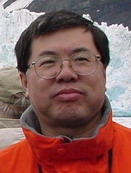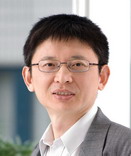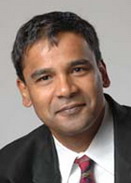 |
第33届中国控制会议(CCC2014)大会报告人
|
 Er-wei Bai was educated at Fudan University and Shanghai Jiaotong University, both in Shanghai China. He received his PhD degree from University of California at Berkeley. He is currently Professor of Electrical and Computer Engineering, and of Radiology at the University of Iowa, Iowa City, Iowa, USA. He is also World Class Research Professor, School of Electronics, Electrical Engineering and Computer Science at Queen's University, Belfast, UK. His research areas are in identification, signal processing, control and their applications in engineering and life science problems. Er-wei Bai was educated at Fudan University and Shanghai Jiaotong University, both in Shanghai China. He received his PhD degree from University of California at Berkeley. He is currently Professor of Electrical and Computer Engineering, and of Radiology at the University of Iowa, Iowa City, Iowa, USA. He is also World Class Research Professor, School of Electronics, Electrical Engineering and Computer Science at Queen's University, Belfast, UK. His research areas are in identification, signal processing, control and their applications in engineering and life science problems.
He has served as an associate editor for a number of journals and as a member of technical committees for professional societies. He is a recipient of the Presidential Award for Teaching Excellence and the Board of Regents Award for Faculty Excellence. Dr. Bai has published extensively in the areas and is a Fellow of IEEE.
|
 Frank Doyle holds the Duncan and Suzanne Mellichamp Chair in Process Control in the Department of Chemical Engineering, as well as appointments in the Electrical Engineering Department, and the Biomolecular Science and Engineering Program at UC, Santa Barbara. He is the Director of the UCSB/MIT/Caltech Institute for Collaborative Biotechnologies, and is the Associate Dean for Research in the College of Engineering. He received a B.S.E. degree from Princeton, C.P.G.S. from Cambridge, and Ph.D. from Caltech, all in Chemical Engineering. Prior to his appointment at UCSB, he has held faculty appointments at Purdue University and the University of Delaware, and held visiting positions at DuPont, Weyerhaeuser, and Stuttgart University. Frank Doyle holds the Duncan and Suzanne Mellichamp Chair in Process Control in the Department of Chemical Engineering, as well as appointments in the Electrical Engineering Department, and the Biomolecular Science and Engineering Program at UC, Santa Barbara. He is the Director of the UCSB/MIT/Caltech Institute for Collaborative Biotechnologies, and is the Associate Dean for Research in the College of Engineering. He received a B.S.E. degree from Princeton, C.P.G.S. from Cambridge, and Ph.D. from Caltech, all in Chemical Engineering. Prior to his appointment at UCSB, he has held faculty appointments at Purdue University and the University of Delaware, and held visiting positions at DuPont, Weyerhaeuser, and Stuttgart University.
He has been recognized as a Fellow of multiple professional organizations including: IEEE, IFAC, AIMBE, and the AAAS. He served as the editor-in-chief of the IEEE Transactions on Control Systems Technology from 2004-2009, and was the Vice President for Publications in the Control System Society from 2011-2012. In 2005, he was awarded the Computing in Chemical Engineering Award from the AIChE for his innovative work in systems biology, and in 2012 was a finalist for the WYSS Institute - IEEE EMBS Award for Translational Research. His research interests are in systems biology, network science, modeling and analysis of circadian rhythms, and drug delivery for diabetes.
|
 Gang Feng received the B.Eng and M.Eng. degrees in Automatic Control from Nanjing Aeronautical Institute, China in 1982 and in 1984 respectively, and the Ph.D. degree in Electrical Engineering from the University of Melbourne, Australia in 1992. Gang Feng received the B.Eng and M.Eng. degrees in Automatic Control from Nanjing Aeronautical Institute, China in 1982 and in 1984 respectively, and the Ph.D. degree in Electrical Engineering from the University of Melbourne, Australia in 1992.
He has been with City University of Hong Kong since 2000 where he is now a Chair Professor of Mechatronic Engineering. He was also a ChangJiang Chair Professor at Nanjing University of Science and Technology, awarded by Ministry of Education, China. He was lecturer/senior lecturer at School of Electrical Engineering, University of New South Wales, Australia, 1992-1999. He was awarded an Alexander von Humboldt Fellowship in 1997-1998, and the IEEE Transactions on Fuzzy Systems Outstanding Paper Award in 2007. He has authored/co-authored over 200 international journal papers including over 90 in IEEE Transactions and numerous conference papers. His current research interests include intelligent systems & control, networked systems & control, and multi-agent systems & control.
Prof. Feng is an IEEE Fellow, an associate editor of IEEE Transactions on Fuzzy Systems, and was an associate editor of IEEE Transactions on Automatic Control, IEEE Transactions on Systems, Man & Cybernetics, Part C, Mechatronics, and Journal of Control Theory and Applications.
|
 Yi Huang received the Ph.D. degree in control theory and its applications from Southeast University, Nanjing in 1995. From 1995 to 1997, she worked as a postdoctoral fellow in the Institute of Systems Science, Chinese Academy of Sciences. From 1997, she has been at the Key Lab. Systems and Control, Chinese Academy of Sciences as an assistant professor and then associate professor and professor. Yi Huang received the Ph.D. degree in control theory and its applications from Southeast University, Nanjing in 1995. From 1995 to 1997, she worked as a postdoctoral fellow in the Institute of Systems Science, Chinese Academy of Sciences. From 1997, she has been at the Key Lab. Systems and Control, Chinese Academy of Sciences as an assistant professor and then associate professor and professor.
Her research work is concentrated on the control of nonlinear uncertain systems. In collaborating extensively with engineers to utilize the idea of the active disturbance rejection control (ADRC) for solving real world problems, she and her team do some further analysis of ADRC.
|
 Karl Henrik Johansson is Director of the KTH ACCESS Linnaeus Centre and Professor at the School of Electrical Engineering, Royal Institute of Technology, Sweden. He is a Wallenberg Scholar and has held a six-year Senior Researcher Position with the Swedish Research Council. He is Director of the Stockholm Strategic Research Area ICT The Next Generation. He received MSc and PhD degrees in Electrical Engineering from Lund University. He has held visiting positions at UC Berkeley (1998-2000) and California Institute of Technology (2006-2007). His research interests are in networked control systems, hybrid and embedded system, and applications in transportation, energy, and automation systems. Karl Henrik Johansson is Director of the KTH ACCESS Linnaeus Centre and Professor at the School of Electrical Engineering, Royal Institute of Technology, Sweden. He is a Wallenberg Scholar and has held a six-year Senior Researcher Position with the Swedish Research Council. He is Director of the Stockholm Strategic Research Area ICT The Next Generation. He received MSc and PhD degrees in Electrical Engineering from Lund University. He has held visiting positions at UC Berkeley (1998-2000) and California Institute of Technology (2006-2007). His research interests are in networked control systems, hybrid and embedded system, and applications in transportation, energy, and automation systems.
He has been a member of the IEEE Control Systems Society Board of Governors and the Chair of the IFAC Technical Committee on Networked Systems. He has been on the Editorial Boards of several journals, including Automatica, IEEE Transactions on Automatic Control, and IET Control Theory and Applications. He is currently on the Editorial Board of IEEE Transactions on Control of Network Systems and the European Journal of Control. He has been Guest Editor for special issues, including the one on "Wireless Sensor and Actuator Networks" of IEEE Transactions on Automatic Control 2011. He was the General Chair of the ACM/IEEE Cyber-Physical Systems Week 2010 in Stockholm and IPC Chair of many conferences. He has served on the Executive Committees of several European research projects in the area of networked embedded systems. In 2009, he received the Best Paper Award of the IEEE International Conference on Mobile Ad-hoc and Sensor Systems. In 2009, he was also awarded Wallenberg Scholar, as one of the first ten scholars from all sciences, by the Knut and Alice Wallenberg Foundation. He was awarded an Individual Grant for the Advancement of Research Leaders from the Swedish Foundation for Strategic Research in 2005. He received the triennial Young Author Prize from IFAC in 1996 and the Peccei Award from the International Institute of System Analysis, Austria, in 1993. He received Young Researcher Awards from Scania in 1996 and from Ericsson in 1998 and 1999. He is a Fellow of the IEEE.
|
 Vijay Kumar is the UPS Foundation Professor in the School of Engineering and Applied Science at the University of Pennsylvania, and on sabbatical leave at White House Office of Science and Technology Policy where he serves as the assistant director for robotics and cyber physical systems. He received his Bachelors of Technology from the Indian Institute of Technology, Kanpur and his Ph.D. from The Ohio State University in 1987. He has been on the Faculty in the Department of Mechanical Engineering and Applied Mechanics with a secondary appointment in the Department of Computer and Information Science at the University of Pennsylvania since 1987. Vijay Kumar is the UPS Foundation Professor in the School of Engineering and Applied Science at the University of Pennsylvania, and on sabbatical leave at White House Office of Science and Technology Policy where he serves as the assistant director for robotics and cyber physical systems. He received his Bachelors of Technology from the Indian Institute of Technology, Kanpur and his Ph.D. from The Ohio State University in 1987. He has been on the Faculty in the Department of Mechanical Engineering and Applied Mechanics with a secondary appointment in the Department of Computer and Information Science at the University of Pennsylvania since 1987.
Dr. Kumar served as the Deputy Dean for Research in the School of Engineering and Applied Science from 2000-2004. He directed the GRASP Laboratory, a multidisciplinary robotics and perception laboratory, from 1998-2004. He was the Chairman of the Department of Mechanical Engineering and Applied Mechanics from 2005-2008. He then served as the Deputy Dean for Education in the School of Engineering and Applied Science from 2008-2012.
Dr. Kumar is a Fellow of the American Society of Mechanical Engineers (2003), a Fellow of the Institution of Electrical and Electronic Engineers (2005) and a member of the National Academy of Engineering (2013).
Dr. Kumar's research interests are in robotics, specifically multi-robot systems, and micro aerial vehicles. He has served on the editorial boards of the IEEE Transactions on Robotics and Automation, IEEE Transactions on Automation Science and Engineering, ASME Journal of Mechanical Design, the ASME Journal of Mechanisms and Robotics and the Springer Tract in Advanced Robotics (STAR). He is the recipient of the 1991 National Science Foundation Presidential Young Investigator award, the 1996 Lindback Award for Distinguished Teaching (University of Pennsylvania), the 1997 Freudenstein Award for significant accomplishments in mechanisms and robotics, the 2012 ASME Mechanisms and Robotics Award, the 2012 IEEE Robotics and Automation Society Distinguished Service Award and a 2012 World Technology Network Award. He has won best paper awards at DARS 2002, ICRA 2004, ICRA 2011, RSS 2011, and RSS 2013, and has advised doctoral students who have won Best Student Paper Awards at ICRA 2008, RSS 2009, and DARS 2010.
|
 Kameshwar Poolla is the Cadence Distinguished Professor at UC Berkeley in EECS and ME. His current research interests include many aspects of future energy systems including economics, security, and commercialization. Kameshwar Poolla is the Cadence Distinguished Professor at UC Berkeley in EECS and ME. His current research interests include many aspects of future energy systems including economics, security, and commercialization.
He also serves as the Founding Director of the IMPACT Center for Integrated Circuit manufacturing. Dr. Poolla co-founded OnWafer Technologies which was acquired by KLA-Tencor in 2007. He has served as a technology and mergers/acquisitions consultant for Cadence Design Systems. Dr. Poolla has been awarded a 1988 NSF Presidential Young Investigator Award, the 1993 Hugo Schuck Best Paper Prize, the 1994 Donald P. Eckman Award, the 1998 Distinguished Teaching Award of the University of California, the 2005 and 2007 IEEE Transactions on Semiconductor Manufacturing Best Paper Prizes, and the 2009 IEEE CSS Transition to Practice Award.He is a Fellow of IEEE.
|
